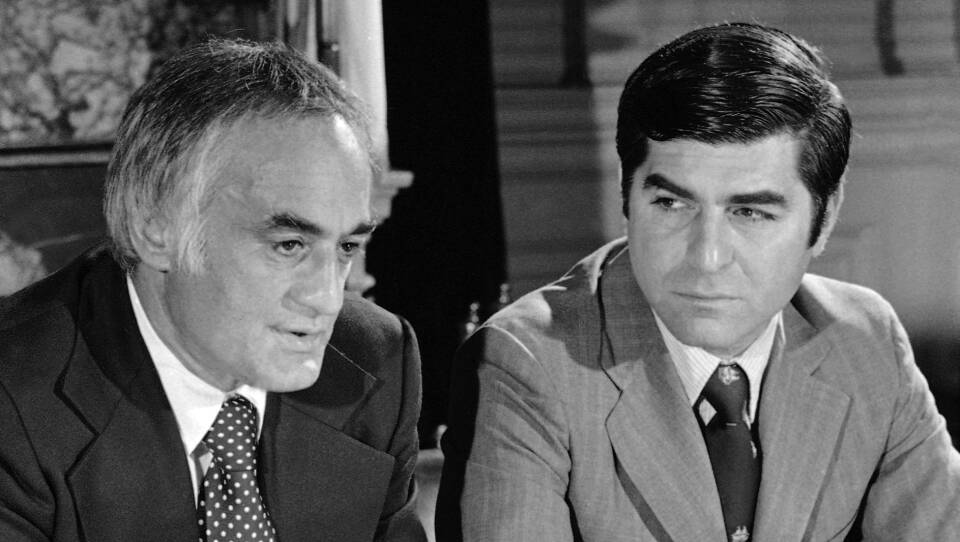Francis X. Bellotti, a longtime fixture of Democratic politics who was elected attorney general of Massachusetts three times but fell short in multiple bids for governor, passed away Tuesday morning at the age of 101.
“His life spanned more than a century and was wholly dedicated to serving others,” Bellotti’s family said in a statement released Tuesday. “He was ever the devoted family man. He and Maggie [Bellotti’s wife] lovingly raised 12 children, instilling in them the values of discipline, leadership, and compassion.”
Bellotti, who served as a Navy SEAL in World War II, was first elected attorney general in 1974, when he narrowly beat Republican Josiah Spaulding. In 1978, in his first bid for reelection, Bellotti crushed Republican William Weld, who later went on to become governor of Massachusetts. In 1982, Bellotti again cruised to reelection in a race against Republican Richard Wainwright and Libertarian Michael Reilly.
That string of successes both followed and preceded electoral failures.
In 1964, Bellotti, who had been lieutenant governor of Massachusetts, defeated the sitting Democratic governor, Endicott Peabody, in a bitter primary-election fight, but lost in the general election to Republican John Volpe. In 1966, he ran unsuccessfully for attorney general, losing to Republican Eliot Richardson in the general election. And in 1970, Bellotti lost in the Democratic primary for governor to then-Boston Mayor Kevin White.
Two decades later, Bellotti again lost in the Democratic gubernatorial primary — this time to then-Boston University President John Silber, who was running an insurgent campaign as a conservative, populist Democrat, 53-44. Another candidate, then-lieutenant governor Evelyn Murphy, received just 3% of the vote. Weld, who Bellotti had defeated a dozen years earlier, went on to win the general election.
Scott Harshbarger, who served as attorney general in the 1990s and made his own unsuccessful run for governor in 1998, told GBH News he was hired by Bellotti as chief of the attorney general’s public protection bureau after Bellotti’s 1974 victory. He says Bellotti deserves credit for professionalizing the office of AG — for example, by hiring staff based strictly on merit and prioritizing legal arguments over political considerations.
In 1974, Harshbarger says, Bellotti was elected thanks in part to support from opponents of court-ordered busing to desegregate Boston’s public schools. But then, in one of his first decisions as attorney general, he endorsed Harshbarger’s finding that Judge Arthur Garrity’s decision passed legal muster.
“[Bellotti] said, 'As attorney general, my job is not to do politics but to follow the law,'” Harshbarger told GBH News. “And he ended up being the first attorney general in the country to enter in support of a busing order, for which he was severely criticized by his base.
”He told them, 'If you tell me that Harshbarger is wrong on the law, I will fire him. [But] I am going to follow the law and make decisions based on the law, not in terms of politics. And that was for me, being a mentee, a classic example of Frank Bellotti.“
James Aloisi, the former Massachusetts secretary of transportation, also praised Bellotti’s professionalization of the office.
”He was imposing a rigorous discipline in the office. He abolished part-time lawyers. ... He built a brand-new law library. He would give seminars on case preparation, preparing before you go to court. Just basic lawyerly stuff that hadn’t happened before,“ Aloisi said.
Aloisi added that — for many Massachusetts Italian Americans of a certain age — Bellotti came to embody what a career in politics could entail.
”He had a tough go of it,“ said Aloisi, who first began working for Bellotti as an intern in law school. ”A lot of people in the 1960s said a lot of disparaging things about him because of his ethnicity, made a lot of assumptions that were just not the case. So, for us, it was a validation that we could be successful in what we wanted to do.
“I became secretary of transportation,” Aloisi added. “Bob Travaglini, who worked in the office, became [state] Senate president. So many other people left that office to go on to really important careers in the public sector. His reach is significant.”
Bellotti is survived by 11 children, 25 grandchildren, and 11 great-grandchildren. His wife passed away two years ago.
One of his children, defense attorney and former assistant district attorney Peter Bellotti, said in the family’s statement: “He was always there for us as a guiding light in all our endeavors. I learned from him the power of the law and the special responsibility of serving as an officer of the court.”
Information regarding a commemoration of Bellotti’s life is not yet available.
CORRECTION: This article originally identified Bellotti’s 1974 opponent as Francis Spaulding, not Josiah Spaulding.





